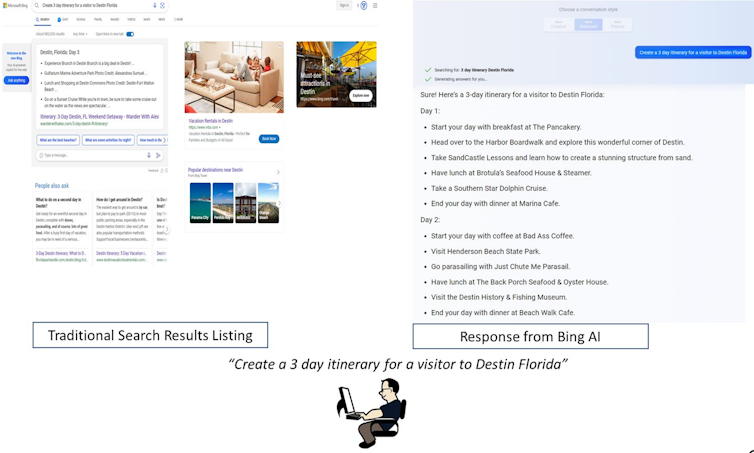Google, Microsoft and others boast that generative artificial intelligence tools like ChatGPT will make searching the web higher than ever for users. For example, quite than having to wade through a sea of URLs, users will give you the option to simply get a solution combed from all the web.
There are also some concerns with the rise of AI-fueled serps, corresponding to the opacity over where information comes from, the potential for “hallucinated” answers and copyright issues.
But one other consequence is that I consider it could destroy the US$68 billion SEO industry that firms like Google helped create.
For the past 25 years or so, web sites, news outlets, blogs and plenty of others with a URL that desired to get attention have used SEO, or search engine optimisation, to “persuade” serps to share their content as high as possible in the outcomes they supply to readers. This has helped drive traffic to their sites and has also spawned an industry of consultants and marketers who advise on how best to try this.
As an associate professor of knowledge and operations management, I study the economics of e-commerce. I consider the growing use of generative AI will likely make all of that obsolete.
How online search works
Someone in search of information online opens her browser, goes to a search engine and kinds within the relevant keywords. The search engine displays the outcomes, and the user browses through the links displayed within the result listings until she finds the relevant information.
To attract the user’s attentions, online content providers use various search engine marketing strategies, corresponding to SEO, paid placements and banner displays.
For instance, a news website might hire a consultant to assist it highlight key words in headlines and in metadata in order that Google and Bing elevate its content when a user searches for the newest information on a flood or political crisis.
Jaap Arriens/NurPhoto via Getty Images
How generative AI changes search process
But this all relies on serps luring tens of hundreds of thousands of users to their web sites. And so to earn users’ loyalty and web traffic, serps must constantly work on their algorithms to enhance the standard of their search results.
That’s why, even when it could hurt a component of their revenue stream, serps have been quick to experiment with generative AI to enhance search results. And this might fundamentally change the net search ecosystem.
All the most important serps have already adopted or are experimenting with this approach. Examples include Google’s Bard, Microsoft’s Bing AI, Baidu’s ERNIE and DuckDuckGo’s DuckAssist.
Rather than getting a listing of links, each organic and paid, based on whatever keywords or questions a user types in, generative AI will as a substitute simply provide you with a text result in the shape of a solution. Say you’re planning a visit to Destin, Florida, and sort the prompt “Create a three-day itinerary for a visitor” there. Instead of a bunch of links to Yelp and blog postings that require plenty of clicking and reading, typing that into Bing AI will lead to an in depth three-day itinerary.

Microsoft Bing
Over time, as the standard of AI-generated answers improve, users can have less incentive to flick thru search result listings. They can save effort and time by reading the AI-generated response to their query.
In other words, it will permit you to bypass all those paid links and expensive efforts by web sites to enhance their search engine optimisation scores, rendering them useless.
When users start ignoring the sponsored and editorial result listings, this can have an opposed impact on the revenues of search engine optimisation consultants, search engine marketers consultants and, ultimately, the underside line of serps themselves.
The financial impact
This financial impact can’t be ignored.
For example, the search engine optimisation industry generated $68.1 billion globally in 2022. It had been expected to succeed in $129.6 billion by 2030, but these projections were made before the emergence of generative AI put the industry vulnerable to obsolescence.
As for serps, monetizing online search services is a major source of their revenue. They get a cut of the cash that web sites spend on improving their online visibility through paid placements, ads, online marketing and the like, collectively often called search engine marketing. For example, roughly 58% of Google’s 2022 revenues – or almost $162.5 billion – got here from Google Ads, which provides a few of these services.
Search engines run by massive firms with many revenue streams, like Google and Microsoft, will likely find ways to offset the losses by coming up with strategies to earn a living off generative AI answers. But the search engine optimisation marketers and consultants who rely upon serps – mostly small- and medium-sized firms – will not be needed as they’re today, and so the industry is unlikely to survive for much longer.
A not-too-distant future
But don’t expect the search engine optimisation industry to fade away immediately. Generative AI serps are still of their infancy and must address certain challenges before they’ll dominate search.
For one thing, most of those initiatives are still experimental and infrequently available only to certain users. And for an additional, generative AI has been notorious for providing incorrect, plagiarized or just made-up answers.
That means it’s unlikely in the intervening time to realize the trust or loyalty of many users.
Given these challenges, it shouldn’t be surprising that generative AI has yet to transform online search. However, given the resources available to researchers working on generative AI models, it’s secure to assume that eventually these models will turn out to be higher at their task, resulting in the death of the search engine optimisation industry.
This article was originally published at theconversation.com




